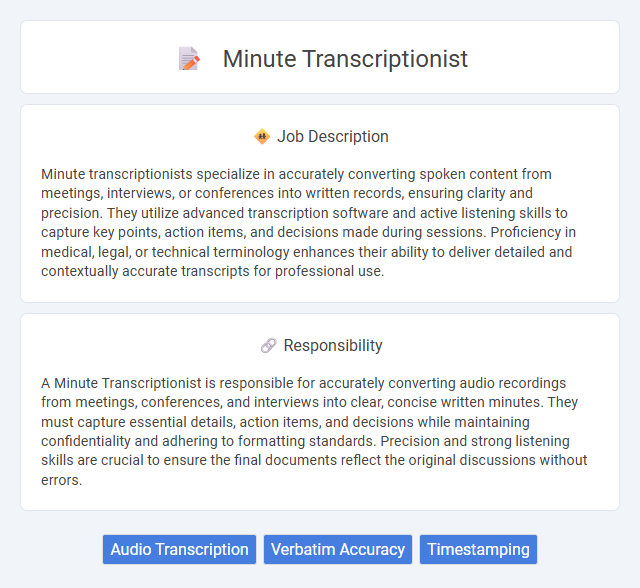
Minute transcriptionists specialize in accurately converting spoken content from meetings, interviews, or conferences into written records, ensuring clarity and precision. They utilize advanced transcription software and active listening skills to capture key points, action items, and decisions made during sessions. Proficiency in medical, legal, or technical terminology enhances their ability to deliver detailed and contextually accurate transcripts for professional use.
Individuals with strong listening skills and attention to detail are likely suitable for a Minute Transcriptionist role, as it requires accurately capturing spoken words in written form. Those who prefer quiet environments and have good typing speed may find the job conditions favorable. However, people who struggle with concentration or have difficulty distinguishing speech nuances might find this role challenging.
Qualification
Minute transcriptionists require exceptional listening skills and a keen attention to detail to accurately capture spoken content during meetings or conferences. Proficiency in transcription software and a strong command of grammar, punctuation, and industry-specific terminology are essential qualifications. Experience in fast typing speeds, typically above 70 words per minute, and the ability to work under tight deadlines further enhance job performance.
Responsibility
A Minute Transcriptionist is responsible for accurately converting audio recordings from meetings, conferences, and interviews into clear, concise written minutes. They must capture essential details, action items, and decisions while maintaining confidentiality and adhering to formatting standards. Precision and strong listening skills are crucial to ensure the final documents reflect the original discussions without errors.
Benefit
Minute transcriptionist roles likely offer benefits such as flexible working hours and the opportunity to work remotely, which can enhance work-life balance. There is also a probability of skill development in listening and typing accuracy, potentially opening doors to higher-paying transcription or administrative positions. Some employers may provide additional perks like access to transcription software, training programs, or health benefits depending on the company.
Challenge
Minute Transcriptionist roles may present challenges such as the need to accurately capture fast-paced speech and complex terminology, which can require high levels of concentration and typing speed. The probability of facing ambiguous audio due to multiple speakers or poor sound quality might demand enhanced listening skills and efficient error correction. Meeting tight deadlines frequently could increase pressure, necessitating effective time management and prioritization abilities.
Career Advancement
Minute transcriptionist roles offer a solid foundation for advancing into specialized fields such as legal transcription, medical transcription, or executive assistant positions. Developing expertise in audio editing software and legal or medical terminology significantly enhances career prospects and salary potential. Continuous skill refinement and certification can lead to supervisory roles or freelance opportunities, increasing both autonomy and income.
Key Terms
Audio Transcription
A Minute Transcriptionist specializes in converting audio recordings into accurate, written minutes for meetings, conferences, and interviews. Proficiency in audio transcription software, excellent listening skills, and a strong grasp of grammar are essential for ensuring precise and clear documentation. Expertise in identifying key points and formatting transcripts to meet organizational standards enhances the value of transcribed content for business and legal purposes.
Verbatim Accuracy
Minute transcriptionists ensure verbatim accuracy by capturing every spoken word precisely as heard, including fillers, pauses, and non-verbal cues, to produce an exact written record. High-quality verbatim transcription relies on exceptional listening skills, advanced typing proficiency, and familiarity with specialized terminology. Maintaining confidentiality and meeting tight deadlines are critical components of delivering reliable, accurate transcripts for legal, medical, or corporate settings.
Timestamping
A Minute Transcriptionist specializing in timestamping ensures precise time-coded transcripts by accurately marking speech at regular intervals, typically every 30 seconds or per speaker change, enhancing the usability of audio or video recordings for legal, medical, or corporate purposes. Expertise in transcription software and keen attention to detail are critical for correlating spoken content with exact timestamps, improving searchability and reference in lengthy recordings. Consistent timestamping supports efficient information retrieval and compliance with industry standards, making the transcription process integral to documentation accuracy.
 kuljobs.com
kuljobs.com